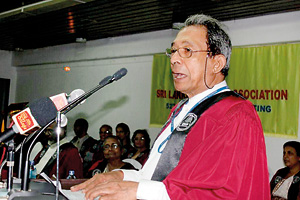IT Info
Librarians have an important role to play in eSri Lanka initiative: ICTA Chairman
View(s):
ICTA Chairman, Senior Presidential Advisor and Peradeniya University Chancellor Professor. P.W. Epasinghe delivering his address. Chief Guest at the Sri Lanka Library Association’s 52nd Annual General Meeting held at the Sri Lanka Foundation Institute, Colombo recently.
‘’Librarians have an important role to play in the eSri Lanka initiative’’, says ICT Agency of Sri Lanka (ICTA) Chairman, Senior Presidential Advisor and Peradeniya University Chancellor Professor P.W. Epasinghe. The Professor said so while participating, as the chief guest, at the Sri Lanka Library Association’s 52nd Annual General Meeting held at the Sri Lanka Foundation Institute, Colombo recently.
Delivering his address Professor Epashinghe emphasised the huge possibilities the librarians have in accelerating the attainment of Sri Lanka to the position of a regional knowledge hub. The ICTA Chairman also explained how the island-wide existence of Nenasala’s, or digital resource based centres or libraries were an ideal network for making the benefits of ICT reach the people. While dwelling on the six-pronged programme of ICTA for implementing the eSri Lanka initiative, Professor Epasinghe also underlined the following:
Librarians in ideal position to build knowledge hub.
“Librarians are in a better position to offer their cooperation in building Sri Lanka as a knowledge hub of the region. Library Associations and the Sri Lanka Library Association in particular, are in an ideal position to take Sri Lanka on the path to Sri Lanka becoming a Wonder of Asia’’, ICTA Chairman said pointing out the huge possibilities libraries and library professionals have in leading the country towards the highest achievements in knowledge.
Countrywide libraries for digital content, a concept of the President
Tracing the origin of Nenasala - library for digital content the Professor said: ‘’About five years ago, only some privileged city-dwellers had easy access to the internet. His Excellency President Mahinda Rajapaksa in his far-sighted vision wanted the computer taken to the village. This vision is now spelled out in what one might call libraries for digital content. These are the 677 centres spread island-wide under the 1000 Nenasala project, a brainchild of His Excellency. ICTA designed this project and implements it.
“These centres or wisdom outlets provide an island-wide service in bringing the benefits of ICT to the rural population. These have been set up in easily accessible and convenient locations. Each Nenasala is equipped with three to four personal computers with Internet access, a laser printer, scanner, web camera and other accessories. The concept of shared computing (sometimes called “Virtual Desktops”) is now implemented in Nenasalas: the excess power of a PC is leveraged for powering multiple computing sessions at once. A “virtual desktop” experience is provided through the access devices to each end user using his/her own monitor, keyboard and mouse”, the professor said explaining the facilities available in Nenasala’s.
Content for library users through ICTA programmes
Underlining the role ICTA plays in the development of content available in libraries including Nenasala’s Professor Epasinghe said: “The means of accessing content and services was thus implemented but it was also necessary to create relevant content for users. ICTA, therefore, implemented the e-Society programme, which entailed creating an empowered knowledge based society. One of the strategies of ICTA’s e-Society programme is to facilitate the development of innovative locally relevant local language content.
Key library function of sorting in local languages
Referring to a much pervasive library function the Professor went on to say: “As you know much more than I do, libraries have to deal with sorting. They have to deal with large volumes of information material. These could be printed materials, such as serial publications, magazines, monographs or books. With the commencement of the digital age, information material could also be videos, CDs etc. Now when one has an ocean of such materials, he is lost. It is here that we need the service of the librarian who solves the problem. His basic methodology is sorting. For example, he may arrange the information material in alphabetical order. We are familiar with arranging according to the Roman alphabet, ABCDEF. But the majority in rural Sri Lanka is not familiar with ABCDEF and so on.
The majority is familiar only with ayanna, aayanna in Sinhala or aanaa, aavanaa in Tamil. All major functions of library science, cataloguing, classifying and information retrieval have to do with sorting. What a wonderful facility it would be for rural Sri Lanka if sorting could be done in the local language? Well ICTA-initiated projects under the local language programme have achieved this.
‘’A local language content portal, www.danuma.lk was developed. A wide selection of content in local language was sourced through the Lake House Newspapers, digitised and uploaded to www.danuma.lk. Workshops were held for Nenasala operators, school children, teachers and community-based organisations on local content, Unicode Sinhala etc. They were trained on e-commerce, accessing agricultural information and e-services etc. Content was sourced from various organisations and saved on DVDs which were distributed among them. Subsequently, as the range expanded and included many areas such as education, agriculture, health, commerce etc., specially designed software (content library) with a facility for easy navigation was developed and distributed island-wide. One such specific project was the Sinhala Wikipedia.

























